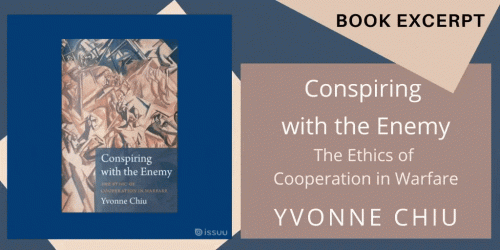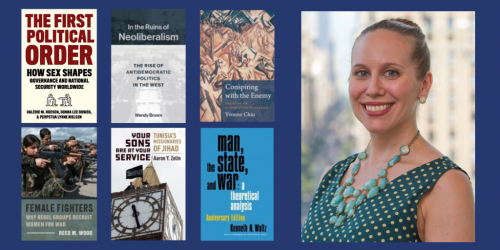Why Enemies Cooperate in Times of War
By Yvonne Chiu

“War is the fiercest form of human competition, yet it often involves cooperation among adversaries, even as they try to slaughter one other. Drawing on an impressive survey of military history—ancient and modern, Eastern and Western—Yvonne Chiu distinguishes among numerous forms of cooperation in war and even identifies an “ethic of cooperation” of which she finds manifestations throughout the history of warfare.”
~Jeff McMahan, University of Oxford
This week’s featured title is Yvonne Chiu’s Conspiring with the Enemy: The Ethic of Cooperation in Warfare. Today’s guest post looks at how and why enemies work together to constrain violence in warfare.
Enter this week’s drawing for a chance to win a copy of the book!
• • • • • •
Human history is in some ways the story of trying to concurrently wage and tame war. Although warfare brings out the worst in humanity, cooperation between enemies even as they are trying to kill each other is as commonplace as it is surprising. But sometimes antagonists cooperate in order to kill each other, for example, only in ways deemed mutually acceptable or “fair” by restricting use of chemical and biological weapons. Sometimes adversaries cooperate in order to not kill the wrong people while trying to kill each other, for example, by respecting principles of civilian and medical immunity. Sometimes enemies cooperate to limit the scope of warfare for everyone’s net benefit, for example, through ritual warfare or quick decisive battle.
Repeated cooperation between enemies in no way diminishes the horrifying barbarism that constitutes the overwhelming majority of warfare.Rather, these meaningful exceptions are an attempt to contain and make sense of war’s atrocities, even if frequently in vain.
Such cooperation is born of various motivations, including reciprocity, self-preservation, and efficiency, but also warrior honor and humanitarianism, and these very different forms of cooperation often persist despite making it more difficult for one side or the other to win. Unfortunately, however, their well-meaning motivations can also lead to unintended tragic consequences, for example, when “humanitarian pauses” inadvertently prolong a conflict by giving combatants time to rearm and end up harming and killing more civilians, directly contradicting their intent to protect certain categories of innocents.
“Many principles of warfare ethics and international law that are commonly assumed to be based on moral rights are actually grounded in the ethic of cooperation in warfare…”
Many principles of warfare ethics and international law that are commonly assumed to be based on moral rights are actually grounded in the ethic of cooperation in warfare, e.g., noncombatant immunity, equal medical treatment, nonpenal detention and conditions in captivity for POWs, etc. These codified international legal rights are products of convention that has implications for both military ethics and the international political system.
Conventions rarely evolve in ways that are completely consistent with each other, and one challenge for military ethics is balancing the competing imperatives of two different areas of cooperation: sparing civilians while killing in acceptable manners.
Advancements in military technology such as sniping were developed to gain military advantage while reducing the risks to one’s own warfighters. For all their utility, however, snipers have always been viewed with suspicion and hatred and deemed murderous and unjust, even by their own side. Sniping and other long-range precision attacks do not give the target a chance to fight back and can kill without the target even knowing he or she is in its sight, which runs afoul of a common notion of fairness. Some American snipers in Vietnam were called “Murder, Inc.” by fellow American soldiers, a British infantry battalion in the 1980s referred to its own snipers as “The Leper Colony,” and captured snipers have often suffered extrajudicial punishment and even summary execution for their perceived unfairness.
Targeting technology can redound to the benefit of bystanders, however, if used to protect civilians, for example, by striking a limited target with an armed drone (UAV) instead of with ground troops who will inevitably encounter and endanger more civilians. With proper targeting and safeguards to minimize collateral damage, increased accuracy can kill proportionally fewer civilians.
“Advancements in military technology such as sniping were developed to gain military advantage while reducing the risks to one’s own warfighters.”
But either way of reconciling the tension between fairness and protecting civilians will present problems. If fairness is prioritized and targeted long-range munitions (e.g., drone strikes) restricted, then civilians will suffer more casualties from the use of closer-range combat. If civilian protection is prioritized, however, then targeted weapons should be used as much as possible; but how civilians die makes a difference to prospects for genuine resolution to a conflict, and perceived unfairness in civilian deaths—even if they are fewer in number than with the counterfactual—may merely extend the conflict or lay tinder for future conflict to reignite.
Tension between different types of cooperation has implications not only for military ethics and just war theory but also for broader questions of geopolitics and international governance. The extreme distance from which UAVs can kill raises questions that generally are not asked about snipers, including what a battlefield is and what constitutes a zone of combat, under what circumstances one can legitimately kill off of it, and whether these targeted killings are acts of war against legitimate targets or instead assassinations. Snipers are generally aiming at fighters they can see (with optical assistance), but combat drones are piloted from far afield of the battleground—sometimes from eight thousand miles away—and targets often include the enemy’s political and religious leaders, who are not normally considered fair game in a war.
Controversy around targeted killings with UAVs is only one example that highlights the ways in which cooperation between enemies in warfare extends beyond physical acts of war and rests on cooperation in the international sphere about foundational concepts such as legitimacy and sovereignty.
“Tension between different types of cooperation has implications not only for military ethics and just war theory but also for broader questions of geopolitics and international governance.”
International law as codified in the Geneva Conventions restricts lawful combatants to members of armed forces or militias with established hierarchies and chain of command, use fixed and distinctive emblems, carry arms openly, and act in accordance with international laws and norms of jus in bello. The POW protections they receive are also extended to accompanying civilian and crew members of military forces, as well as to inhabitants of unoccupied territories who spontaneously “levée en masse” when invaded, provided they carry arms openly and adhere to international laws of combat. The Geneva Conventions Additional Protocol I (1977) also extend combatant status and accompanying treatment to fighters in revolutionary, secession, or independence movements who “owing to the nature of hostilities…cannot so distinguish himself” as an armed combatant through the use of distinctive emblems so long as he carries arms openly. While all fighters, regardless of their actions, are protected from murder, mutilation, cruelty, torture, “outrages upon personal dignity,” and unfair trials by the Geneva Conventions’ Common Article 3, these are given to unlawful combatants by virtue of their basic human rights, not their status as legitimate warfighters.
The international law’s conception of legitimacy is bound to its conception of sovereignty. With few exceptions, one cannot be a legitimate fighter unless one represents an accepted sovereign state or a group with competing sovereign claims (e.g., an independence movement).
But what constitutes a legitimate sovereign state? The usual measures of sovereignty are inconsistently applied: some states do not have monopoly on the use of force, to use Weber’s definition (e.g., Syria), or violate all manner of human rights and principles of democratic political participation (e.g., China, Saudi Arabia, Iran) but are recognized internationally, while other states that meet these criteria in spades are not (e.g., Taiwan).
“When the legitimacy of a target is questionable, UAV killings bleed into the realm of assassinations, which are not permitted internationally, and stretch the boundaries of warfare.”
Instead, the international structure largely privileges the status quo by prioritizing existing governments regardless how they got there, with some consideration for geopolitical utility, e.g., occupying land with large oil reserves or in geographically strategic locations, or having massive economic and military potential. With that international recognition of sovereignty comes extensive privileges, regardless of what domestic legitimacy those governments may lack.
In this way, cooperation between enemies informs the very architecture of both warfare and politics itself in how it defines and assigns “legitimacy” and “sovereignty.” Targeted drone killings illustrate the complexity of this phenomena, as the flip side of the question “who is a lawful combatant with standing to fight in war?” is “who is a legitimate target?” When the legitimacy of a target is questionable, UAV killings bleed into the realm of assassinations, which are not permitted internationally, and stretch the boundaries of warfare. UAV killings can also both shore up and erode the sovereignty of the state where the targets reside.
Legitimacy and sovereignty in the international realm are negotiated concepts, determined by coordinated and uncoordinated practices between international actors. This can be problematic because the concepts of legitimacy and sovereignty in the domestic realm are grounded in claims of moral right. Liberal societies (or any society espousing universalistic values) are in an especially challenging position of trying to extend the duties of justice in some way—demands of justice from beyond one’s borders can be discounted, but not entirely—but to an international political framework that defines and structures legitimacy and sovereignty very differently. While the international laws of warfare and the international political structure are not wholly decoupled from considerations of justice, they are grounded fundamentally in interest and power. This mismatch makes it more challenging when cooperative and noncooperative forms of warfare clash, e.g., when conventional warfare and contemporary terrorism meet and challenge the foundations of the international political structure.





